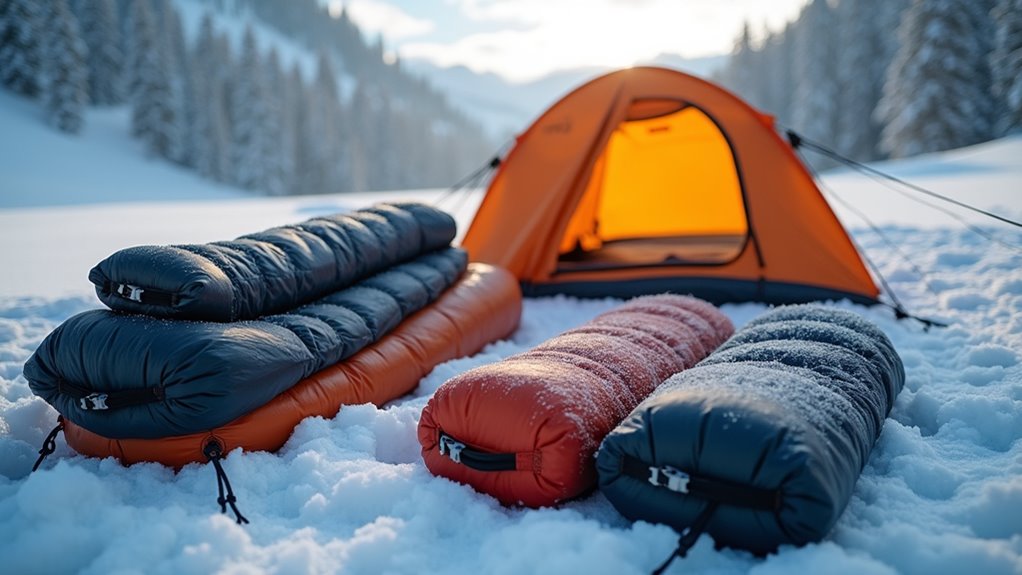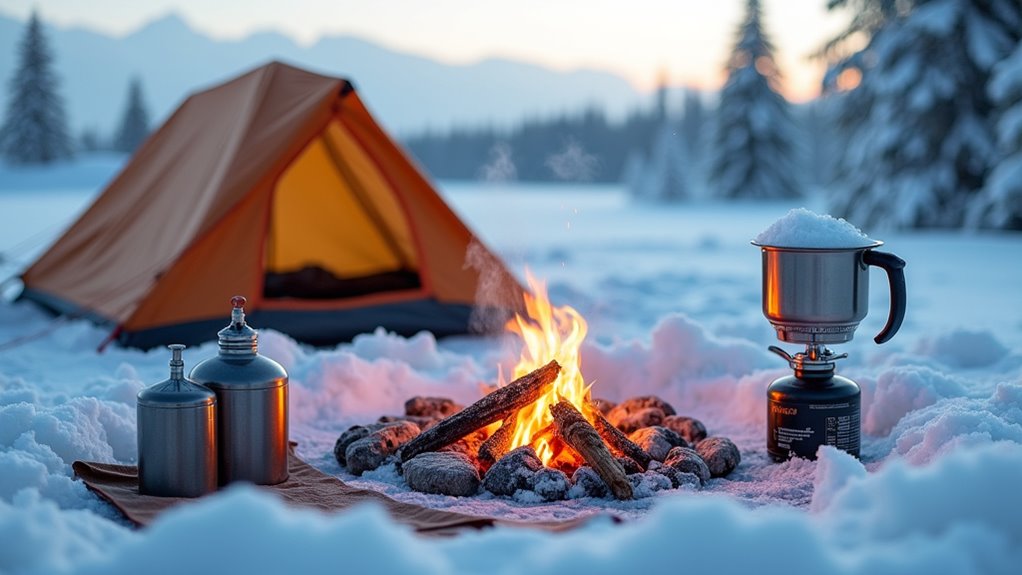Physical Address
304 North Cardinal St.
Dorchester Center, MA 02124
Physical Address
304 North Cardinal St.
Dorchester Center, MA 02124

Brace yourself for winter camping's brutal realities—these survival tips could mean the difference between adventure and disaster.
You’ve probably wondered if winter camping is worth the extra challenge, and here’s the truth—it absolutely can be if you’re properly prepared. The serene beauty of snow-covered landscapes and the satisfying crackle of a campfire in freezing air create unforgettable experiences. However, the margin for error shrinks dramatically when temperatures drop below freezing. Your gear choices, shelter decisions, and survival knowledge become the difference between an epic adventure and a potentially dangerous situation that’ll test every outdoor skill you possess.

When winter’s harsh conditions can turn a peaceful camping trip into a dangerous ordeal, having the right gear becomes your lifeline to comfort and safety. You’ll need a four-season tent that can withstand heavy snow loads and fierce winds.
Your sleeping system should include a winter-rated sleeping bag and an insulated sleeping pad with high R-value to prevent heat loss to frozen ground.
Don’t skimp on layered clothing – merino wool base layers, insulating mid-layers, and waterproof outer shells are essential.
Pack extra batteries since cold drains power quickly, and bring a reliable headlamp with backup lighting.
A portable camp stove designed for cold weather ensures you’ll stay nourished and hydrated.
Just like deciding whether to rent or buy a boat for fishing, you should consider renting winter camping gear before making expensive purchases to test what works best for your needs.
Having the right gear sets you up for success, but proper shelter setup can make or break your winter camping experience. Choose a sheltered spot away from wind and potential avalanche zones.
Winter camping success hinges on smart shelter placement—find protection from wind and avoid avalanche-prone areas at all costs.
Pack down the snow where you’ll pitch your tent—this creates a solid foundation and prevents sinking.
Build windbreaks using snow blocks or natural barriers like rocks and trees. Your tent’s entrance should face away from prevailing winds.
Inside, create a vestibule area for gear storage and cooking to keep moisture out of your sleeping space.
Layer insulation beneath you using closed-cell foam pads and inflatable sleeping pads. Cold transfers quickly through snow, so don’t skimp on ground insulation.
Keep your sleeping bag dry and fluffed for maximum warmth retention throughout the night.
If you’re new to winter camping or don’t want to invest in expensive cold-weather gear right away, consider renting camping equipment to test what works best for your needs before making major purchases.

While shelter protects you from the elements, managing food, water, and fire becomes considerably more challenging when temperatures drop below freezing. You’ll need calorie-dense foods that won’t freeze solid – nuts, energy bars, and dried fruits work well.
Keep water bottles inside your sleeping bag to prevent freezing, and always carry backup purification tablets.
Fire management requires extra preparation. Gather tinder, kindling, and fuel wood before darkness falls. Create a platform of green logs or stones to keep your fire above snow level.
You’ll burn through wood faster in cold conditions, so collect more than you think you need.
Cook simple, hot meals that warm you from within. Soups, stews, and hot beverages aren’t just nourishing – they’re morale boosters during long winter nights.
If winter camping feels too demanding, consider RV camping as an alternative that still allows you to experience the outdoors with better protection from harsh weather conditions.
While winter’s harsh winds bite at your face, you’ll discover an inner warmth that summer camping can’t provide. You’ve learned the gear essentials, mastered shelter techniques, and conquered fire management—now you’re ready to embrace what others fear. The cold that once intimidated you becomes your teacher, showing resilience you didn’t know existed. Don’t let frozen ground stop you; let it ground you in confidence. Winter’s waiting—and you’re finally prepared to answer its call.